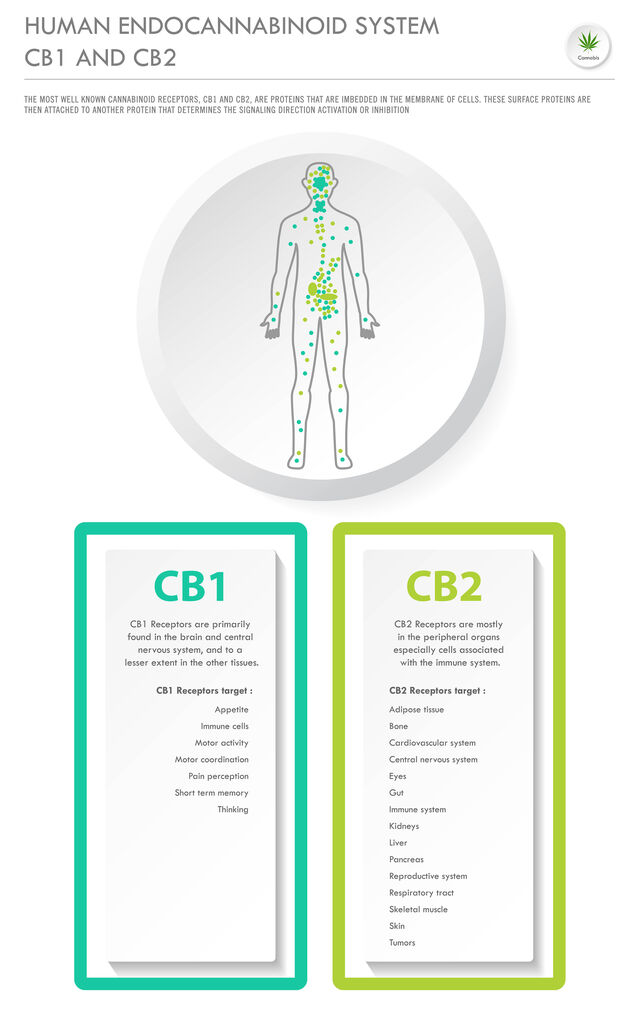CBD
The Gut-Brain Axis Meets the Endocannabinoid System
Insights into the ECS role in psychology and physiology
Posted April 29, 2022 Reviewed by Hara Estroff Marano
Key points
- The endocannabinoid system (ECS) plays an integral role in human biochemistry.
- The gut-brain-ECS axis is directly related to depressive symptoms, which can be relieved with probiotics and endocannabinoids.
- Lack of pleasure and of motivation are associated with decreased gut microbe diversity and altered endocannabinoid levels.
- CBD consumption increases both beneficial gut microbes and not-so- beneficial pro-inflammatory substances.
By Keith A. Sharkey, PhD with Kristofer S. Svendsen and Timothy D. Roth
A Short History of Cannabis and Discovery of the ECS
Medicinal plants have long been utilized for their beneficial effects, because many plants produce molecules that have chemical or functional similarities to molecules in the human body. One such example is cannabis. Cannabis has been cultivated for thousands of years and used medicinally since at least 2700 BCE China, where it was consumed as an appetite stimulant.1

In the 1990’s, following the discovery that Δ9-tetrahydrocannabinol (THC) was the main psychotropic component of cannabis, molecules were identified in our bodies that acted on the same receptors that cannabis stimulates. The first endocannabinoid to be discovered was termed anandamide, taken from the Sanskrit “ananda” meaning “bliss”.2 Subsequently, an entire system of related chemicals was described, which is now called the endocannabinoid system (ECS). And it is an integral part of the biochemistry that controls the human body.
The Endocannabinoid System and The Gut
The ECS regulates aspects of almost every organ system in the body, and the gut is no exception. The gastrointestinal tract is a vital organ system of great complexity and sophistication. But much of what we eat cannot be digested without the help of the trillions of microbes that live alongside us in the gut. Gut microbes synthesize essential nutrients, assist with digestion, promote proper immune function, and regulate metabolism. They also make substances that act in the brain and alter its function.
Recent research has found that bacterial byproducts (metabolites) also regulate endocannabinoid levels in the gut that influence motility (movement of food along the GI tract) and intestinal permeability. The ECS also plays a role in metabolism; glycogen, protein, and lipid synthesis all require ECS activation. But when the ECS is overactivated, an imbalance occurs with the hormones that control hunger. This can result in a pathophysiological state involving abnormal endocannabinoid signaling, which is associated with disorders such as obesity.3,4

ECS Role in the Gut-Brain Axis: Recent Findings
A 2020 study5 examined the role of the microbiome and ECS in mice displaying depressive symptoms. The investigators found that the symptoms were accompanied by a decrease in endocannabinoid signaling, associated with a reduction in microbiome produced fatty acid precursors. They discovered that the depressive symptoms could be relieved by supplementation with a Lactobaccilli species probiotic or by enhancing endocannabinoid levels pharmacologically.
A follow-up study in Oxford6 examined this effect in the human population using the TwinsUK data registry of twins in the U.K.. The authors found that anhedonia (inability to experience pleasure) and amotivation (lack of motivation) could be predicted by the degree of microbial diversity in the gut. This association also correlated with fecal levels of the endocannabinoid molecule palmitoylethanolamide. Their findings suggest that the gut microbiome-ECS plays an important role in motivation and emotional states.
Cannabidiol Oil (CBD): Panacea or Problematic?
With legalization of cannabis in Canada and several states in the U.S. many people have begun using products such as cannabidiol (CBD) oil. Although beneficial effects of these products have been widely reported, recent studies have also shown that regular consumption can have complicated physiological effects.
For example, in a 2020 preclinical study7, investigators showed that daily consumption of CBD oil for two weeks alters the gut microbiome. The authors found that the beneficial gut microbe species Akkermansia muciniphila was elevated, but proinflammatory mediators were also increased. Therefore, regular CBD oil consumption may have both positive and negative effects. These results suggest that while cannabis products can bring great relief for some people, more research is necessary to understand the full effects of these products on the human body.
Conclusion
The gut microbiome and ECS affect each other in a reciprocal fashion and, through this relationship, influence our psychological and physiological states. In turn, what we choose to put in our bodies can alter these relationships both positively and negatively. Undoubtedly, further investigation of the gut-brain-microbiome-ECS relationship will result in new therapeutic discoveries for many conditions ranging from gastrointestinal disorders like irritable bowel syndrome to mood disorders such as anxiety and depression.
References
1. Russo EB. The Pharmacological History of Cannabis. Handb Cannabis. 2015;(February):23–43.
2. Cristino L, Bisogno T, Di Marzo V. Cannabinoids and the expanded endocannabinoid system in neurological disorders [Internet]. Vol. 16, Nature Reviews Neurology. 2020. p. 9–29. Available from: https://doi.org/10.1038/
3. Watkins BA. Diet, endocannabinoids, and health. Nutr Res [Internet]. 2019;70:32– 9. Available from: https://doi.org/10.1016/j.nutres.2019.06.003
4. Iannotti FA, Di Marzo V. The gut microbiome, endocannabinoids and metabolic disorders. J Endocrinol. 2021;248(2):R83–97
5. Chevalier G, Siopi E, Guenin-Macé L, Pascal M, Laval T, Rifflet A, et al. Effect of gut microbiota on depressive-like behaviors in mice is mediated by the endocannabinoid system. Nat Commun. 2020;11(1)
6. Minichino A, Jackson MA, Francesconi M, Steves CJ, Menni C, Burnet PWJ, et al. Endocannabinoid system mediates the association between gut-microbial diversity and anhedonia/amotivation in a general population cohort. Mol Psychiatry. 2021;26(11):6269–76
7. Skinner CM, Nookaew I, Ewing LE, Wongsurawat T, Jenjaroenpun P, Quick CM, et al. Potential Probiotic or Trigger of Gut Inflammation–The Janus-Faced Nature of Cannabidiol-Rich Cannabis Extract. J Diet Suppl [Internet]. 2020;17(5):543–60. Available from: https://doi.org/10.1080/19390211.2020.1761506


